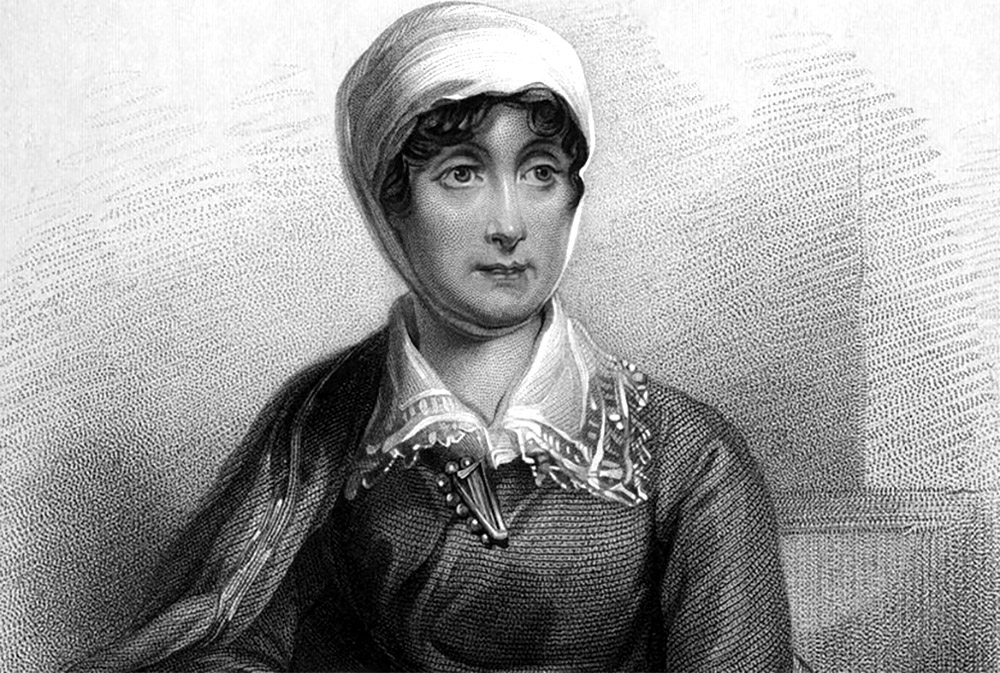Joanna Baillie part 2
In Part 1 we left Joanna as a 10 year old entertaining her friends with her own theatrical shows. Four years later, in 1776 Joanna’s father was appointed Professor of Divinity at Glasgow University, so the family moved to Glasgow, but that only lasted 2 years as her father died and she moved, with her mother and sister, to Long Calderwood in Lanarkshire.
Here she mostly educated herself, reading Shakespeare and the major British poets.
When she was 22, Joanna, with her sister Agnes, joined their brother Matthew, now a qualified doctor, to live in London and, 7 years later, the sisters moved to Hampstead – then definitely on the outskirts of London! Shortly after their arrival Joanna wrote a poem describing the then view from the heath:
London
It is a goodly sight through the clear air.
From Hampstead’s heathy height to see at once
England’s vast capitol in fair expanse.
Towers, belfries, lengthen’d streets, and structures fair.
St. Paul’s high dome amidst the vassal bands
Of neighb’ring spires, a regal chieftain stands.
And over fields of ridgy roofs appear,
With distance softly tinted, side by side
In kindred grace, like twain of sisters dear,
The Towers of Westminster, her Abbey’s pride;
While, far beyond, the hills of Surrey shine
Through thin soft haze, and show their wavy line.
View’d thus, a goodly sight! but when survey’d
Through denser air when moisten’d winds prevail
In her grand panoply of smoke array’d,
While clouds aloft in heavy volumes sail.
She is sublime — She seems a curtain’d gloom
Connecting heaven and earth — a threat’ning sign of doom. . . .
So shows by day this grand imperial town;
And, when o’er all the night’s black stole is thrown,
The distant traveller doth with wonder mark
Her luminous canopy athwart the dark.
In London Joanna now began writing, intending to publish. Favourable reviews of her first collection of poems, published anonymously in 1790, encouraged her to continue writing and she published, still anonymously, a series of plays on The Passions.
What is now Rosslyn Hill Unitarian chapel, was in Joanna’s day a Presbyterian chapel where the minister was the Rev Rochemont Barbauld. His wife was the radical writer Anna Letitia Barbauld, and they made their home the centre of an influential group of literary people. When Joanna joined this group she didn’t tell anyone about her published works.
She was described as ‘a stiff, solemn Scotch girl — small and light in person,who sat demurely while her work was discussed.’
Lucy Aikin (niece of Mrs Barbauld and near neighbour in Hampstead, also buried in our churchyard) recorded —
‘I well remember the scene,she and her sisterarriving on a morning call at Mrs. Barbauld’s; my aunt immediately introduced the topic of the anonymous tragedies, and gave utterance to her admiration with that generous delight in the manifestation of kindred genius, which distinguished her. But not even the sudden delight of such praise, so given, could seduce our Scottish damsel into self-betrayal. The faithful sister rushed forward, as we afterwards recollected, to bear the brunt, while the unsuspected author lay snug in the asylum of her taciturnity.’
A critic in the Quarterly Review described the sensation caused by this first, anonymous appearance of the Plays on the Passions: ‘The curiosity excited in the literary circle … the incredulity … that these vigorous and original compositions came from a female hand … the astonishment, when they were acknowledged to be by a gentle, quiet and retiring young woman.’
No doubt our church congregation well knows to never underestimate a quiet woman!
